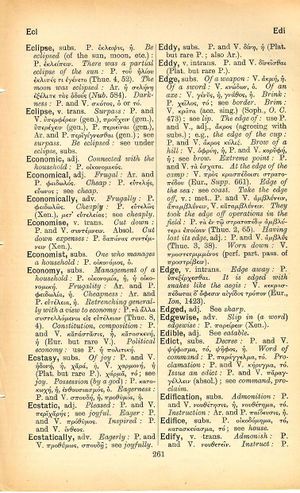edge: Difference between revisions
ἀλλ’ οὔτε πολλὰ τραύματ’ ἐν στέρνοις λαβὼν θνῄσκει τις, εἰ μὴ τέρμα συντρέχοι βίου, οὔτ’ ἐν στέγῃ τις ἥμενος παρ’ ἑστίᾳ φεύγει τι μᾶλλον τὸν πεπρωμένον μόρον → But a man will not die, even though he has been wounded repeatedly in the chest, should the appointed end of his life not have caught up with him; nor can one who sits beside his hearth at home escape his destined death any the more
(Woodhouse 2) |
(CSV4) |
||
| Line 1: | Line 1: | ||
{{ | {{Woodhouse1 | ||
| | |Text=[[File:woodhouse_261.jpg|thumb|link={{filepath:woodhouse_261.jpg}}]]'''subs.''' | ||
<b class="b2">Of a weapon</b>: V. [[ἀκμή]], ἡ. | |||
<b class="b2">Of a sword</b>: V. [[κνώδων]], ὁ. | |||
<b class="b2">Of an axe</b>: V. [[γένυς]], ἡ, [[γνάθος]], ἡ. | |||
<b class="b2">Brink</b>: P. [[χεῖλος]], τό; see [[border]]. | |||
<b class="b2">Brim</b>: V. [[κρᾶτα]] (acc. sing.) (Soph., ''O.C.'' 473); see [[lip]]. | |||
<b class="b2">The edge of</b>: use P. and V., adj., [[ἄκρος]] (<b class="b2">agreeing with subs.</b>); <b class="b2">e.</b> <b class="b2">g., the edge of the cup</b>: P. and V. [[ἄκρος]] [[κύλιξ]]. | |||
<b class="b2">Brow of a hill</b>: V. [[ὀφρύη]], ἡ, P. and V. [[κορυφή]], ἡ; see [[brow]]. | |||
<b class="b2">Extreme point</b>: P. and V. τὰ ἔσχατα. | |||
<b class="b2">At the edge of the camp</b>: V. πρὸς κρασπέδοισι στρατοπέδου (Eur., ''Supp.'' 661). | |||
<b class="b2">Edge of the sea</b>: see [[coast]]. | |||
<b class="b2">Take the edge off</b>, v.: Met.. P. and V. ἀμβλύνειν, ἀπαμβλύνειν, V. καταμβλύνειν. | |||
<b class="b2">They took the edge off operations in the field</b>: P. τὰ ἐν τῷ στρατοπέδῳ ἀμβλύτερα ἐποίουν (Thuc. 2, 65). | |||
<b class="b2">Having lost its edge</b>, adj.: P. and V. [[ἀμβλύς]] (Thuc. 3, 38). | |||
<b class="b2">Worn down</b>: V. προστετριμμένος (perf. part. pass. of προστρίβειν). | |||
'''v. intrans.''' | |||
<b class="b2">Edge away</b>: P. ὑπεξέρχεσθαι. | |||
<b class="b2">It is edged with snakes like the aegis</b>: V. κεκρασπέδωται δʼ ὄφεσιν αἰγίδος τρόπον (Eur., <b class="b2">Ion</b>, 1423). | |||
}} | }} | ||
Revision as of 09:37, 21 July 2017
English > Greek (Woodhouse)
subs.
Of a weapon: V. ἀκμή, ἡ. Of a sword: V. κνώδων, ὁ. Of an axe: V. γένυς, ἡ, γνάθος, ἡ. Brink: P. χεῖλος, τό; see border. Brim: V. κρᾶτα (acc. sing.) (Soph., O.C. 473); see lip. The edge of: use P. and V., adj., ἄκρος (agreeing with subs.); e. g., the edge of the cup: P. and V. ἄκρος κύλιξ. Brow of a hill: V. ὀφρύη, ἡ, P. and V. κορυφή, ἡ; see brow. Extreme point: P. and V. τὰ ἔσχατα. At the edge of the camp: V. πρὸς κρασπέδοισι στρατοπέδου (Eur., Supp. 661). Edge of the sea: see coast. Take the edge off, v.: Met.. P. and V. ἀμβλύνειν, ἀπαμβλύνειν, V. καταμβλύνειν. They took the edge off operations in the field: P. τὰ ἐν τῷ στρατοπέδῳ ἀμβλύτερα ἐποίουν (Thuc. 2, 65). Having lost its edge, adj.: P. and V. ἀμβλύς (Thuc. 3, 38). Worn down: V. προστετριμμένος (perf. part. pass. of προστρίβειν). v. intrans. Edge away: P. ὑπεξέρχεσθαι. It is edged with snakes like the aegis: V. κεκρασπέδωται δʼ ὄφεσιν αἰγίδος τρόπον (Eur., Ion, 1423).

